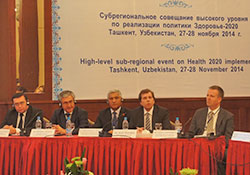Working together for health and health equity goals

WHO
What are success factors and good practice that can be used to increase commitment and accountability for health and health equity goals across governments and societies?
On 27-28 November 2014, representatives from 8 countries in the WHO European Region met in Tashkent, Uzbekistan to share their policy experiences and the key lessons learned from the design and implementation of cross sectoral approaches to improve health and well-being. The meeting’s format provided a platform to discuss health policy developments that recognize the Health 2020 strategic objectives of reducing inequalities and better governance, using social determinants and equity perspectives.
"The event has been a milestone in the Government of Uzbekistan's and the 8 invited delegations' commitment to implementing Health 2020 in their countries. Multisectoral efforts in governance especially with ministries of education have been well demonstrated in several countries. We are looking forward to the fruits of this collaboration in terms of the peoples' state of health and wellbeing in the future," said Asmus Hammerich, WHO Representative in Uzbekistan.
On the agenda in Tashkent
The event is one in a series of high-level Health 2020 sub –regional events being organized by WHO/Europe in partnership with Member States. Key points on the agenda included:
- Initiating a sub-regional dialogue towards improving understanding and action on key Health 2020 principles;
- Contextualizing the main evidence studies underpinning the Health 2020 Policy Framework to support their uptake and implementation to the specific realities of participating countries; and
- Exploring common priority areas, needs and challenges in implementing goals for improving health and wellbeing.
The meeting, include a mix of short presentations, country case examples, moderated plenary discussions and site visits was hosted by the Government of Uzbekistan. It brought together senior policy makers representing the countries of Azerbaijan, Kazakhstan, Latvia, Romania, Tajikistan, Turkey, Turkmenistan and Uzbekistan. UN Partner organizations including the United Nations Chidren’s Fund, the UNITED Nations Population Fund, the United Nations Educational, Scientific and Cultural Organization, the Joint United Nations Programme on HIV and AIDS, the United Nations Office on Drugs and Crime, and the United Nations Development Programme also took part.
Fostering dialogue
Participating countries are all taking up the Health 2020 challenge in different ways, including through the development of new national health policies aligned with Health2020, through the implementation of renewed policies and services for maternal and child health, and through public health programmes that address the risk and burden of noncommunicable diseases through the engagement of sectors including education, agriculture and with UN agencies and ministries of rural and urban development.
These health policy developments reflect a clear and growing commitment to implement the main priorities and approaches of the Health 2020 policy framework adapted to the different political, policy and development conditions of countries in the WHO European Region.
The sub regional event also provided an opportunity to present and received feedback on the draft National Health Plan of the Republic of Uzbekistan.
The event is part of a package of policy and political support from the WHO Regional Office for Europe to provide continuous support to Member States and partners



